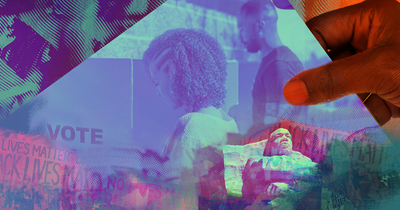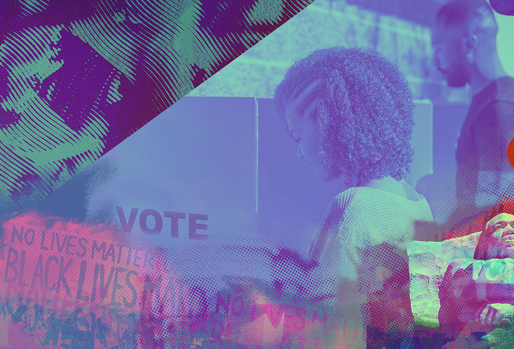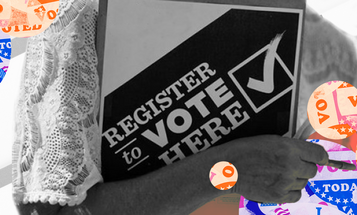
This Constitution Day, How We Can Undo the White Supremacist Roots of Our Nation’s Founding
Problems in our Constitution have fueled a centuries-long assault on Black people and required an ongoing struggle to secure the right to vote. This is why we put forth a proposal to undo racist disenfranchisement schemes and finally, fully guarantee the right to vote.

September 17th is “Constitution Day,” the anniversary of the day in 1787 that the U.S. Constitution was ratified. For over a century, states and cities have celebrated this date, which became a national holiday in 2004. And it seems harmless enough: after all, what’s not to celebrate about the U.S. Constitution?
As it turns out, a great deal.
Created by an all-white, wealthy, male group of “founding fathers,” the original Constitution was replete with white supremacist ideas designed to protect and prolong the institution of slavery and to exclude all those the “fathers” didn’t deem worthy of citizenship.
Even though enslaved people could pursue neither life nor liberty, much less vote, their numbers were used to entrench the political power of their oppressors.
Crafted just a decade after the Declaration of Independence, itself rich with lofty language about democracy, equality, and the right to self-determination, the Constitution didn’t mince words about who was not included in that language. In the slave import limitation, the Constitution’s drafters explicitly prohibited regulation of the trafficking of Africans to Europe and the Americas. Through the fugitive slave clause, they created, for the first time, a national right of the propagators of chattel slavery to pursue and apprehend the humans they owned anywhere in the country. And through their “three-fifths compromise,” they dreamed up a provision to inflate white Southern political power for generations to come, counting enslaved people as three-fifths of a person during apportionment. Even though enslaved people could pursue neither life nor liberty, much less vote, their numbers were used to entrench the political power of their oppressors.
While the fierce resistance of Black people to enslavement led to the eventual abolition of each of these provisions, we see the vestiges of this “Proslavery Constitution” today in the impunity with which police officers and white vigilantes alike kill Black Americans for jogging, sleeping, driving, existing while Black. We experience this perverse history in the modern systems and institutions that govern our lives—from the housing and labor markets to our education and health care systems—and which methodically advantage white over Black and brown, rich over poor.
Some of this can be traced to one oddity within the Constitution itself: the absence of an affirmative, guaranteed right to vote. This omission has allowed states, municipalities, and the federal government to deny the franchise to the very same people deemed not worthy of citizenship when the document was drafted—Black and brown Americans—through ever-creative means and loopholes.
Over generations, movements led by Black Americans have won hard-fought amendments to the Constitution, expanding the franchise to include Black and brown people, women, and young people who have turned 18. These struggles, and the amendments they realized, also protected against some of the most blatant forms of disenfranchisement, like poll taxes and the wholesale exclusion from presidential elections of the residents of Washington, D.C. And they have led to game-changing laws like the Voting Rights Act and the National Voter Registration Act.
Examining this history, one thing is clear: any ambiguity in our Constitution is used to exclude marginalized people from full participation in our democracy.
Yet year after year, Black and brown people, low-income people, young people, people with disabilities, people with limited English proficiency, and others still face obstacles that make it difficult, or impossible, to make our voices heard in this democracy. The weaponization of a global pandemic to silence voters, the brazen starving of the USPS in the months before Election Day, and the violent intimidation tactics targeting voters of color are just the latest in a long history of racist voter suppression. Examining this history, one thing is clear: any ambiguity in our Constitution is used to exclude marginalized people from full participation in our democracy.
The centuries-long assault on Black people and the ongoing struggle to secure the right to vote for all are deeply and inextricably tied. Both are the result of founding and enduring deficiencies in our Constitution. And the abolition of the former is dependent on the fulfillment of the latter. As the Movement for Black Lives makes clear in its comprehensive Vision for Black Lives, “Black life and dignity require Black political will and power.”
That’s why we at Demos have put forth a proposal to finally, fully guarantee the right to vote and to undo once and for all the racist disenfranchisement schemes that have kept our democracy from its full potential for centuries. Our Right-to-Vote Amendment for a 21st Century Democracy names the many ways the right to vote has been obstructed over the years and offers concrete remedies to these distortions of our democracy. It is one way to build durable political power and to protect and advance a truly inclusive democracy.
Our 11-section amendment:
- states the right to vote in the affirmative;
- promotes universal voter registration by constitutionalizing automatic voter registration and same-day registration;
- protects against practices that deny or dilute the voting rights of historically disenfranchised communities;
- abolishes the Electoral College and ensures the president and vice president are elected directly by the people;
- establishes statehood for the District of Columbia;
- guarantees sovereignty and self-determination of political status to the people of the U.S. territories;
- ends the practice of penal disenfranchisement;
- prevents unfair partisan gerrymandering;
- curbs the distorting role of big money in politics;
- and give Congress broad enforcement powers.
A constitutional amendment is, of course, a long-term proposition, and one that will require a great deal of organizing and activism, policy and legal expertise. However, we at Demos are clear-eyed about the bold, transformative solutions that are needed to address problems of democratic exclusion that are as old as our nation. And we believe we are living in a unique democracy moment, one in which the national consciousness of the intersecting poisons of white supremacy and democratic exclusion is growing, and more and more people are understanding the urgency of the creative and courageous organizing that has long resisted these ills.
In moments like these, we must talk honestly about the root causes of the problems we face and consider solutions that take direct aim at those roots, replacing them with the seeds of an inclusive, multiracial democracy. Demos’ Right-to-Vote Amendment is one such solution. We hope it will prompt a spirited conversation this Constitution Day, and every day after, about what it will take to build the democracy to which we aspire.





